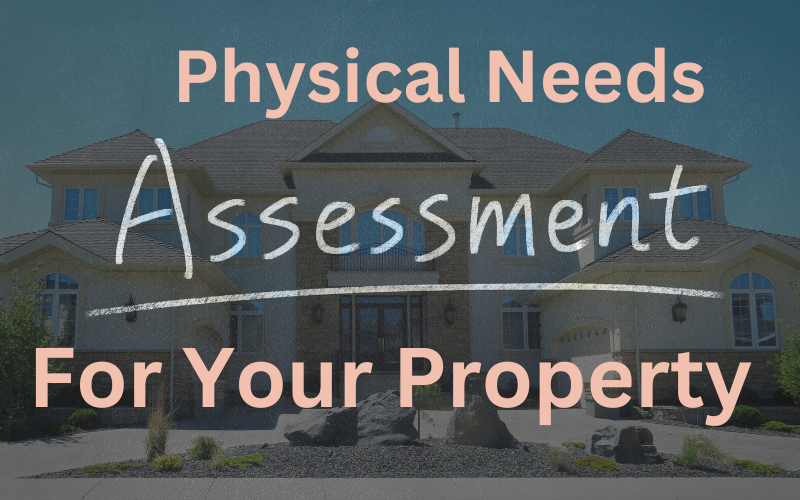What is a Physical Needs Assessment?
A Physical Needs Assessment (PNA) is a critical evaluation that property managers and housing authorities use to determine the long-term needs of a property. This assessment helps identify repairs, upgrades, and improvements necessary to maintain the property’s safety, habitability, and compliance with HUD regulations. By conducting regular Physical Needs Assessments, property managers can proactively plan for repairs, budget more effectively, and avoid costly violations, ensuring the property remains a safe and secure environment for tenants.
In this guide, we will discuss the importance of Physical Needs Assessments, how they benefit property managers, and how NSPIRE Experts can support you throughout the process.
Why a Physical Needs Assessment is Essential for Property Managers and Housing Authorities
A Physical Needs Assessment is more than just an inspection; it is a comprehensive evaluation of the property’s current state and future needs. For property managers and housing authorities, it serves as a roadmap for maintaining the property and ensuring compliance with HUD and other regulatory standards. Here’s why they are essential:
- Budgeting for Repairs: PNAs help property managers plan for future repairs, preventing unexpected, large expenses.
- Ensuring Compliance: Regular PNAs ensure properties meet HUD standards and local housing regulations, reducing the risk of non-compliance and penalties.
- Prolonging Property Life: Early detection of issues like structural damage, plumbing problems, or HVAC failure can prevent costly repairs down the line.
By understanding the property’s needs upfront, managers can prioritize repairs, keep costs down, and maintain a property that is safe, comfortable, and compliant.

The Benefits of Conducting a Regular Physical Needs Assessment
Conducting a PNA provides numerous benefits to property managers and housing authorities, including:
- Early Detection of Potential Problems: Identifying issues before they escalate helps avoid emergency repairs and improves tenant safety.
- Prioritization of Repairs: With a clear understanding of the property’s needs, managers can prioritize repairs based on urgency and available resources.
- Improved Budgeting: A PNA provides insight into long-term capital expenditures, helping property managers allocate funds effectively for repairs and renovations.
- Increased Tenant Satisfaction: Regular assessments ensure the property remains in excellent condition, leading to happier tenants and fewer complaints.
By identifying both immediate and long-term needs, PNAs empower property managers to maintain a high standard of living for tenants while managing resources efficiently.
What to Expect During a Physical Needs Assessment
A Physical Needs Assessment involves a thorough inspection of the entire property. Typically, this includes evaluating the following areas:
- Structural Integrity: Inspecting the foundation, roof, walls, and other structural components to ensure they are sound and stable.
- Plumbing and Electrical Systems: Checking for leaks, damage, and potential issues that may cause disruptions or unsafe living conditions.
- HVAC Systems: Ensuring heating, ventilation, and air conditioning systems are functional and meet safety standards.
- Safety Features: Evaluating fire safety equipment, security systems, and compliance with accessibility standards.
- Environmental Issues: Assessing for mold, pest infestations, or other health hazards.
NSPIRE Experts conduct a detailed physical needs assessment that includes a full property evaluation, ensuring that all aspects of the property are properly inspected and documented for future improvements.

How NSPIRE Experts Can Help with Physical Needs Assessments
NSPIRE Experts offers comprehensive pre-inspections that serve as a vital step before official HUD inspections. We help identify potential issues that could affect your HUD inspection results and provide actionable recommendations for repairs and upgrades.
NSPIRE Pre-Inspection Process
Our NSPIRE Pre-Inspection Services ensure your property is ready for any official inspection. We perform a comprehensive review and provide a detailed report, helping you address any deficiencies before the inspectors arrive. This proactive approach prevents unexpected failures and streamlines the entire inspection process.
For more details, explore our NSPIRE Pre-Inspection Services.

NSPIRE Pre-Inspection: A Step Above the Rest
NSPIRE Experts offers a proactive pre-inspection service that goes beyond a typical inspection. We assess every aspect of your property, from structural issues to compliance with HUD’s standards. By partnering with NSPIRE Experts, property managers can stay ahead of potential compliance issues and make necessary repairs before they become costly problems.
Our NSPIRE Pre-Inspection service provides:
- Detailed Reports: Get clear, actionable recommendations to fix deficiencies.
- On-site Expert Evaluation: Our team inspects the property with an eye for detail, ensuring every potential issue is identified.
- Cost-saving Solutions: By identifying problems early, we help you avoid expensive repairs in the future.
Learn more about how we can help you stay compliant with our NSPIRE Pre-Inspection Services.
Free NSPIRE Consultation: Get Expert Guidance
If you’re unsure where to begin or need guidance on conducting a Physical Needs Assessment, we offer a free NSPIRE consultation. During the consultation, our experts will help you understand your property’s needs, provide insights on HUD compliance, and discuss how NSPIRE Experts can support you in maintaining the property effectively.
Take advantage of our free NSPIRE consultation today.
Common Mistakes in Physical Needs Assessments and How to Avoid Them
Even experienced property managers can make mistakes during the Physical Needs Assessment process. Common pitfalls include:
- Overlooking Long-term Needs: Focusing too much on immediate repairs and ignoring future capital expenditures.
- Incomplete Documentation: Failing to document deficiencies and repairs can lead to missed opportunities for improvement.
- Inadequate Planning for Repairs: Without a comprehensive assessment, repairs can be rushed or neglected, leading to bigger problems later.
To avoid these mistakes, it’s essential to work with experts who understand the intricacies of HUD compliance and property management. Our team helps you avoid common mistakes by providing detailed reports and actionable plans.
For tips on avoiding mistakes during CapEx projects, check out our CapEx Projects: Common Mistakes.

How a Physical Needs Assessment Impacts Your Property’s Long-Term Success
Regular Physical Needs Assessments are a key part of a long-term property management strategy. By identifying potential issues early, property managers can:
- Create a Sustainable Maintenance Plan: Properly plan repairs and upgrades to ensure the property’s long-term health.
- Extend the Property’s Lifespan: Regular assessments help prevent major breakdowns, saving money on costly repairs.
- Improve Property Value: Well-maintained properties are more attractive to tenants and can command higher rents.
NSPIRE’s Expertise in Property Maintenance and Renovations
NSPIRE Experts provides expert support in managing your property’s maintenance and renovations. Our team helps you stay compliant with HUD regulations while ensuring that your property is always in top condition. Whether it’s completing repairs identified during a Physical Needs Assessment or undertaking major renovations, we’ve got you covered.
Learn more about our Property Maintenance & Renovation Services.
Physical Needs Assessment and NSPIRE Scoring: A Connection You Need to Understand
Did you know that regularly conducting Physical Needs Assessments can positively impact your NSPIRE score? By identifying and addressing deficiencies, you can improve your chances of passing inspections and avoiding costly fines.
To learn more about how NSPIRE scoring works and how to improve your score, read our What is the NSPIRE Scoring Methodology?.
What Happens If You Fail a REAC Inspection and How to Avoid It
Failing a REAC inspection can result in penalties, loss of funding, and a tarnished reputation. A Physical Needs Assessment helps ensure that you avoid such failures by identifying and addressing issues before the inspection. If you do fail, our experts are here to guide you through the process of fixing deficiencies and preparing for a re-inspection.
Learn more about the implications of failing a REAC inspection and how to avoid it by visiting What Happens If You Fail a REAC Inspection?.
Conclusion: Stay Ahead of Property Needs with Physical Needs Assessments
A Physical Needs Assessment is essential for property managers and housing authorities aiming to keep their properties compliant, safe, and well-maintained. By identifying issues early, planning for future repairs, and partnering with NSPIRE Experts, you can ensure your property’s long-term success.
Ready to ensure your property’s compliance and stay ahead of future needs?
Schedule a free consultation with NSPIRE Experts today!
